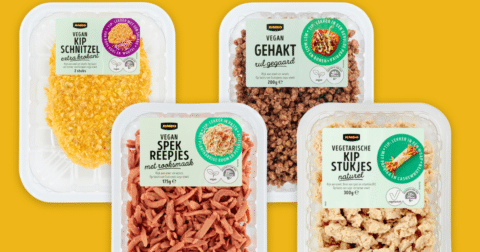Investigation
What Does a Small Town Do When the Water Is Undrinkable?
Climate•8 min read
Solutions
‘Protein splits’ appear to be working — but is there hope the trend could spread to the U.S.?


Words by Sophie Kevany
European supermarkets are helping customers eat less meat and more plants in a bid to improve dietary health and reduce emissions. The new initiative, known as protein splits, aims to expand supermarket sales of plant proteins and shrink sales of animal ones. In Europe, a combination of shoppers wanting to eat less animal protein due to rising health, animal welfare and environmental concerns — plus supermarkets’ own worries about reducing their emissions and, in one country, government backing — appear to be driving the splits’ initial success. Here’s how protein splits work, and the prospects for seeing something similar at your local supermarket here in the United States.
In the Netherlands, which has led the protein split initiatives, the idea was born after roundtables between food system advocacy groups and retailers were held to discuss what the country calls a “protein transition” — a food system shift aimed at reducing dependency on meat and other proteins sourced from livestock.
Examples of animal proteins used to calculate the splits include fish, dairy, meat and eggs. Plant proteins include beans, pulses, nuts and seeds, as well as meat and dairy alternatives.
Though discussions around eating less meat are often fraught and contentious, this particular idea came about collaboratively. “It was fully voluntary [and later] the government…included it in their own protein monitor and commissioned the publication of the first national protein split,” says Pablo Moleman of ProVeg, a Dutch NGO that advocates for a more plant-based food system.
From there, the idea spread to other European NGOs and international retail outlets, he says.
The split initiatives appear to be working, at least for one major Dutch retailer, where meat sales have fallen. The supermarket, Jumbo, is the second-largest in the Netherlands and made headlines in March by ending discounts on fresh animal meat as part of efforts to flip its current protein split sales from 60 percent animal/40 percent plant to 60 percent plant/40 percent animal by 2030.
Other major supermarkets that have publicly committed to reaching 60 percent plant protein sales in the Netherlands by 2030 include Aldi, Dirk, Ekoplaza and Lidl, according to a government-commissioned protein split assessment published in March this year.
The emergence of the protein split initiative in the Netherlands is not surprising. Years of intensive farming, which made the country one of the world’s leading dairy and pork exporters, have also turned the country into a nitrogen pollution hotspot.
There are also rising concerns about public health, especially heart disease (the country’s top non-infectious killer in 2021), as well as concern over diseases that spread from animals to humans. Active civil society groups have been a factor too, raising public awareness of intensive livestock production’s negative impact on the climate, air and water, says Florian Wall of Madre Brava, an NGO that advocates for sustainable food systems.
Earlier this year, a survey of Dutch consumers found consumers’ highest motivation for eating less meat and dairy was health, followed by animal welfare and environmental concerns.
Other efforts to reduce the effects of intensive animal protein production include a Dutch-led search for alternative proteins, like lab-grown meats, and a recent government announcement that it aims to increase the consumption of plant proteins to 50 percent of the national diet by 2030.
Yet another factor pushing the Netherlands ahead of other countries is size. The small country has become a global hub for food production and innovation, growing lots of food on tiny plots that are, in some ways, the exact opposite of America’s vast agricultural lands. But being so innovative cuts both ways, says Moleman — the country has one of the highest livestock densities in the world, but also the highest per capita consumption of meat alternatives in Europe.
It’s too soon to tell what impact the end of fresh meat discounts will have on Jumbo’s protein split, but, since the summer of 2022, when major Dutch retailers first set their protein split targets, company data shows previous efforts to boost plant sales have succeeded, says Moleman, whose NGO co-authored the Dutch protein split assessment.
Jumbo’s plant-boosting initiatives include the introduction of price parity between animal meats and the supermarket’s own brand of plant alternatives. This led to a jump of 15 percent in alternative sales, and, during the full year 2023, a drop of three percent in conventional meat sales.
At Lidl’s Dutch supermarkets, the current split is 61 percent animal-sourced meat versus 39 percent plant sales, and the company is aiming for a similar flip to selling 60 percent plant proteins by 2030. As part of that effort, Lidl ran a test project that placed alt-meats next to animal meats, resulting in a 7.14 percent increase in plant-based sales, says Moleman. It also launched a minced beef product that uses 40 percent pea protein, is 33 percent cheaper than pure ground beef and produces 37.5 percent less emissions.
Although Moleman says it is too soon for concrete emissions reduction data, lowering animal protein sales is expected to be a priority, given that about 34 percent of indirect, or Scope 3, grocery emissions come from meat, and 17 percent from dairy. The drive to reduce sales from animal-sourced meat will likely accelerate as supermarkets’ own emission targets kick in, with a recent study by Madre Brava finding the 15 largest European supermarket chains “have a target in place or will set one by the end of this year to reduce emissions from the food they sell.”
Even partial reductions of meat and dairy sales should have major climate impacts. Another Madre Brava study found that six major food providers could cut their meat sales emissions by 40 percent if they replaced half their beef, pork, and chicken with legumes, tofu and plant-based meat alternatives.
Now, more European supermarkets have begun publishing their own protein split initiatives, although not all are committing to specific targets. The broader European protein split uptake, says Wall, is driven by factors that include both the emergence of flexitarian consumers and emissions concerns. Just as in the Netherlands, he says, “campaigning by animal welfare and environmental groups…has helped create a growing segment of conscious consumers…looking to cut down on meat and dairy consumption.”
Forward-looking retailers see the shift to selling fewer animal-based products as a way to meet their climate goals. As French retail giant Carrefour told Madre Brava,“a shift from animal proteins to vegetal proteins will be necessary to achieve our Scope 3 [emissions] targets.”
In the UK, where participating grocery chains tend to include fewer products in their protein splits, Lidl’s latest data shows it is selling about 15 percent plant-based protein foods and about seven percent dairy alternatives. The UK chain Sainsbury’s annual data shows about 15 percent of protein sales are plants, while the dairy split is seven percent plant-based. Tesco’s latest disclosure shows a similar plant/animal split of 11 percent plant/89 percent animal-sourced and a dairy split of seven percent plant versus 93 percent meat and other animal-sourced food.
Because of the different measurement systems, it’s difficult to compare the effectiveness of the Dutch and UK splits. Although there are no individual protein split targets, several UK retailers have signed up to a World Wildlife Fund commitment, called the WWF Basket, that includes an “ambition…for retailers to work towards a 50-50 split between sales of plant and animal proteins by 2030.”
To an American consumer, these initiatives might sound a bit like hopeful fan fiction; one more example of the way Europe is so far ahead of the United States when it comes to combating climate change through addressing food systems.
Wall says that although they lag behind Europe, cities like New York, with its university and healthcare company-backed Plant-Powered Carbon Challenge, are blazing a trail.
He holds out hope too that European protein split leaders — which own American brands like Giant and Stop & Shop — might bring “inspiration from what’s happening in Europe” to their locations in the United States.
Culture wars over meat inevitably make these kinds of transitions harder, says Moleman, adding that the Netherlands has its own share of polarization around meat and livestock. But that makes it all the more important for supermarkets to be involved, he argues.
Protein split initiatives have had some challenges, says Moleman. They often work better when major retailers publicly commit together, mainly because being the one to renege in that situation would be bad publicity. Government support for plant-based goals and broader behavior change are important too, he says, as well as improvements in the quality and availability of meat alternatives. Finally, he adds, there are some relatively painless options supermarkets can take, such as removing egg yolks from salad dressing and reducing the meat content of ready meals and adding more plants.
“It is important to realize that the extreme opposition represents a very small but vocal minority, and we should not worry too much about convincing them. There is a much larger group of people that are on the fence; they are not very keen on alternative proteins or on changing their diets, but they broadly support measures to improve planetary and human health,” he says.
At the same time, he warned, plant-based advocates should avoid falling into the trap of becoming culture warriors themselves. “It is crucial that the plant-based movement comes out of its progressive bubble and reaches out to people on the fence,” says Moleman.
Grocery stores, then, are in a unique position to get people eating more plants. Outside of the “progressive bubble,” supermarkets can be a “crucial partner,” says Moleman, one that can “reach almost the whole of society.”